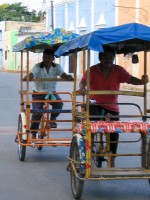
It made me sad to read this, because a) that sucks, and b) it was preventable. Oh, and c) the snide of-course-this-happened-it’s-Mexico tone–but on that topic, I drafted a rather huffy letter, which I’ll spare you.
Everyone should know some really basic facts about the law when driving around the Yucatan (and in Mexico as a whole).
tl;dr: Skip to items #4 and #6.
1. Relax. Corruption just isn’t that prevalent.
I can speak only for the Yucatan, Chiapas and Tabasco, but since 2003, I have driven tens of thousands of miles around that area, and nothing bad has happened.
I have had a grand total of two encounters with police, both positive. In one case, they very sweetly alerted me to the fact that I was going the wrong way down a one-way street. In the other, I was in a traffic accident that was probably my fault. I didn’t even get a ticket either time, much less get hassled for a cash payout.
Granted, I’m a woman, which I think makes me less of a target in this case (chivalry lives in Mexico). Also, my first instinct is to apologize rather than get angry, and I speak Spanish, if badly.
The one firsthand bad-cop story I have heard (one! in all these years) was from a man, and he got out of it by playing dumb: not speaking Spanish and not taking the cop’s hint to pay up. And he admitted he had been speeding.
2. You don’t have to pay the cop!
If you do happen to get pulled over–whether you did something wrong or not–and the cop is suggesting you can pay the fine to him directly…you don’t have to, of course.
It’s not like he’s going to shoot you or kidnap you or beat you up! He’s a traffic cop, not a cartel boss. The Mexican system is not so bad that you’ll be tossed in jail to rot. There’s a whole, functioning system for collecting traffic fines, just like in the US.
Call the dude’s bluff. Smile and apologize, and say you’d be happy to pay the ticket as required, at the police station or through your rental-car company (see #4).
Betcha anything this cop will decide he has better things to do than write you a ticket.
3. A traffic fine costs about US$50.
That’s just not very much. And maybe you were speeding. So maybe you should just take the ticket (if the cop bothers to write it), and pipe down.
You also get a discount if you pay within the first 24 (or maybe 48?) hours, or so I’ve read.
(Can I just note that Waters forked over US$120 in bribe money? Ouch!)
4. And you probably don’t even have to pay that fine either!
Here’s the amazing thing! Cancun, Playa del Carmen and Tulum all have laws on the books granting tourists TWO “courtesy infractions”–official warnings–before being ticketed for anything. (Links go to text of the laws; search for “infracción de cortesía.”)*
Technically, car-rental companies should advise renters of the law and provide them with a leaflet that can be shown to police–though that practice fades in and out, in my experience.
If you do burn through your two warnings and receive a ticket, then you have the option of paying it through your car rental company, when you return the car, for a small extra fee. You never even have to go to the police station.
Simply mentioning the law should deter any cop who’s trying to shake you down. Insist on a written record of the infraction, thank him for his “courtesy,” and be on your way.
5. You really, really shouldn’t pay the cop.
I know, you’re still thinking about it. Why give up any of your vacation time to police stuff? And won’t that little brush with third-world corruption make a good story later? (Jeremy Waters got his published in the New York Times!)
C’mon: corruption takes two people. Every tourist who pays up is paving the way for more cops looking to make a buck. You are part of the problem.
I was about to write “end rant,” but then I remembered: Most of the stories I read about corrupt cop situations, the driver starts by saying, “I was speeding down the highway…” or “My husband was peeing on a bush…” (seriously, that was on TripAdvisor).
Dude, they have traffic laws and laws against peeing in public in Mexico too! If you break them, you get a ticket, just like at home. It’s just douchey to think you can buy your way out of trouble.
OK, really, end rant. On to more info, after the chicken-car break.

6. The car-rental guys aren’t scamming you, although it can look like it.
Peters complained in his essay that a $20/day rental jumped to $40/day at pickup time. I’m almost certain it wasn’t a scam–just the boring old law. Primary liability insurance is required in Mexico, but unlike in the US, almost all of the rental-car companies pass that cost on to the renter, as a separate fee. It’s about $15/day extra, plus taxes.
Most of the major rental companies note this in fine print on the booking page. Go to alamo.com, for instance, and run a search for pickup and drop-off in Cancun–you’ll see “Primary Liability Insurance” is an option. But only if you click to read more will you see the explanation of the Mexican law, and the fact that the only way out of paying is with very good on-paper evidence that your home car insurance covers liability.**
If you rent through a third-party site, such as Kayak, it’s worse–you see only a blanket “additional fees, taxes and insurance may be required,” which is so vague, it’s easy to think it doesn’t apply to you.
FWIW, Hertz is an exception–it carries its own liability insurance and includes it in the total rate, so you will not be charged extra. (At least last I checked.) [EDITED: This is still true, as of January 2017. Hertz will of course try to sell you more insurance, as rental places always do. Note, though, that Hertz is selling you on “supplemental liability insurance,” as opposed to Alamo’s “primary” coverage.]
So yes, it feels like a scam if you’re not forewarned, but the people to blame are the honchos at Alamo/Thrifty/etc. headquarters, not the Mexican guys at the car desk in Cancun.

—————————
*Various websites refer to this law as “Article 152,” but the numbers are different for each city, and they change whenever the traffic laws get tweaked anyway. So you can’t say to the cop, “Dude: Article 152” and expect results.
**I don’t own a car, so I don’t actually know if standard US car insurance will *ever* cover liability on rentals in a foreign country. Does anyone know?
And just to clarify, because it took me a long time to figure this out: There are two kinds of insurance:
- Liability insurance: This covers the damage you might do to other vehicles/drivers. Liability insurance is required virtually everywhere in the world, and often countries or US states require the car company to provide it, included in the rate, where it’s called primary liability insurance and/or LDW. But if the rental company doesn’t bundle it into the price, then you must buy it. Supplemental liability insurance is optional, and it usually just increases the coverage amount. As I say above, it’s not required–but you have to know what risk you’re comfortable with.
- Collision insurance: This covers the damage you might do to the rental car itself, and it is usually covered by your home car insurance and/or a good credit card (issued in the US or Canada only; I don’t think European credit cards play this game?). At the rental counter, you *can* opt out of collision insurance (“decline the CDW,” in the lingo). Of course, the agents may try to upsell you–just like they do in the U.S. And of course, if your credit card isn’t covering collision, you have to decide whether you’re OK with the risk of going without it. And if you decline collision, the rental agency will put a hold on your credit card for a lot of money–between $5,000 and $10,000, depending on the car–until you return the car in one piece.
I know about insurance firsthand, from that car accident a few years ago. It was a great opportunity to find out how the rental-car-insurance system works.
Thanks N: Tired of hearing this stuff about Mexico – it isn’t Breaking Bad country. xxc
Hi Zora, Happy New Year! I took a blog class with you a few years ago. I have been living on the island of Cozumel for 15 years in April. The only thing I have never heard of here on Cozumel (and the police here would probably not know about either) is having a law on the books that gets you out of it the first two times with warnings. Of course the police almost never give tickets here either. For the few times I’ve been stopped, it usually is just to check if I have my proper papers and plates or accidentally running a stop sign. Maybe Cozumel doesn’t have it on their books. Not sure, but the police are definitely not as intimidating as the states and they really are mostly here to help. I even know about fifty of our officers by name.
Anyway great to see you again!
Nice to hear from you, Luh! And thanks for your comment–it is nice to hear some firsthand positive things about the police in that area. The ticketing rules are very local ones, for the Cancun and Playa municipalities, and I assume Cozumel is its own municipality, so just hasn’t adopted this rule. (Probably because there just aren’t as many tourists driving there.)
The police near Cancun on the highway do stop you to get their “tips”.
I was not speeding at all and most of the traffic was passing me by.
A police on a motorcycle pulled me over.
He said I was speeding. I told him I was not speeding and that the average traffic was traveling much faster than me. I do speak Spanish.
He explained he would have to take my license and that I would have to go to the station to pick it up after paying a fine. He wrote a number on his notepad of $2500 pesos and told me that is how much the fine would be at the station.
If I didn’t want to waste my time going to the station in Cancun to get my license and pay the fine, then I could just take care of it now for $2000 pesos cash to him.
I do not have the time to waste going to a police station and waiting in line for hours to get my license back. So 2000 pesos in cash is the shakedown. (about US $120 dollars).
I have not had any “free warnings” and this was the first time I was pulled over for their corrupt “tips”.
It is common and the police do this all the time to drivers that are not violating any laws.
As for renting a car in Cancun or Playa, you will need to purchase liability insurance to be legal driving in Mexico. The rental car company will insist that you buy it.
From my experience, your auto insurance in the USA willl NOT cover Mexico. You can check with your insurance company in the USA. I checked with Hartford Insuance and with 2 others and they will cover Canada, but none cover car rentals in Mexico.
Also check your credit cards for CDW (Collision Damage Waiver), as many that use credit cards in the USA are used to their cards covering the CDW. But after checking several Visa and Mastercard policies, they all excluded CDW in Mexico. So you will probably need to buy all the insurances in Mexico as it appears none is covered by USA insurance companies or by credit cards.
The 3rd party liability insurance is mandatory, but the theft and collision coverages are optional.
I have also found that if you elect to not take the car rental insurance, then the deposit will go from a normal US$400 or US$500 deposit up to US$5,000 to US$10,000 dollars depending on make of car you are renting. They will put a hold on your credit card for that amount of deposit. If you do not want to tie up that much of your availablity on your credit card (if you have that much available), then you will have to buy the insurance.
I shopped and found the cheapest I could get a rental car in Cancun and Playa was approx US$250 per week including all insurance. I rented for a month and it cost US$1,000. to rent a compact car.
Thanks for sharing your experience! Sorry to hear about your “tip” situation. Also sorry to hear you paid it…but that’s just me.
My credit cards (Chase Sapphire, Citicard American Airlines, Starwood AmEx) do offer CDW. I have claimed on it with both Chase and AmEx.
Liability, as I explain above, is based entirely on the rental car company.
And good point about the deposit, if you decline CDW. This is definitely true.
Lucky for you that you have not experienced this. Are you driving a rental car? We were pulled over in the hotel zone after pulling.out of our hotel lot. Told by police we were going 56km in 40 zone, that the fine is $215, and that we would have to.give up our DL and insurance and lose a day of our vacation OR we could pay him $100. First, we were going 57km in 70km zone. Driving in the right lane with cars flying past us. My husband has not had a traffic violation in over 20 years. We were NOT speeding! Second, this is our first time with a rent car in Mexico. Ignorant. Yes. We assumed the police officer was telling the truth. That the speed limit was 40km/hr like he said. That the ticket would cost s $215 like he said. That we would lose a day of our vacation like he said. Shame on us for not researching police officer lies before coming here. We paid him 1500 pesos. Because we BELIEVED him. Shame on him. Shame on mexico for allowing this. And shame on you for writing something to the contrary. We love mexico. We love that our dollars stimulate a struggling economy. We tip generously knowing how low the wages are here. But our dollars to mexico, no more. The incident has made us afraid to be here, if the ones who are hired to protect, ae liars and thiefs.
I just got home from spending an amazing 9 days in Tulum and my last night in Cancun. I picked up my car from the Cancun airport and immediately drove the 1.5 hour trip to Tulum with no issues at all from police. The police in Tulum were also very nice and just mainly left tourists alone from what I noticed. However, the last night in Cancun was terrible! I got pulled over TWICE in the hotel zone. Once for “taking the wrong return ramp” to change directions and a second time for “speeding”. I can say without a doubt that I had not taken the wrong return ramp as we circled back and checked to make sure we hadn’t gone the wrong way – we hadn’t. I also know I wasn’t speeding when I got pulled over the second time because I was hyper-sensitive from the first situation. I was doing 60km in a 70km zone and the cop stated I was doing 85. This particular cop was about to speed by my car and then when he noticed I had a rental car plate, he immediately slammed his breaks next to me and switched his lights on. Ugh.
Both stories were the same – they told me I’d have to go to the Cancun police station to collect my license (which I never handed over) and pay the full fine, or just pay them in cash right there and they would let me go. I know that in some instances it is the tourist’s fault but in mine, I had quite honestly done nothing wrong. My father also lives in Monterrey, Mexico and has stated that this is a very common occurrence for rental cars and that tourists should be aware that they do not need to pay the bribe. I was having such a nice trip until that last night and it really put a damper on the wonderful days I had spent relaxing and enjoying the beautiful country. I’m glad to hear it’s never happened to you!